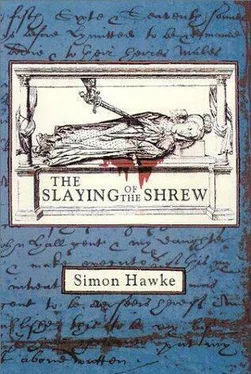Simon Hawke - The Slaying Of The Shrew
Здесь есть возможность читать онлайн «Simon Hawke - The Slaying Of The Shrew» весь текст электронной книги совершенно бесплатно (целиком полную версию без сокращений). В некоторых случаях можно слушать аудио, скачать через торрент в формате fb2 и присутствует краткое содержание. Жанр: Исторический детектив, на английском языке. Описание произведения, (предисловие) а так же отзывы посетителей доступны на портале библиотеки ЛибКат.
- Название:The Slaying Of The Shrew
- Автор:
- Жанр:
- Год:неизвестен
- ISBN:нет данных
- Рейтинг книги:5 / 5. Голосов: 1
-
Избранное:Добавить в избранное
- Отзывы:
-
Ваша оценка:
- 100
- 1
- 2
- 3
- 4
- 5
The Slaying Of The Shrew: краткое содержание, описание и аннотация
Предлагаем к чтению аннотацию, описание, краткое содержание или предисловие (зависит от того, что написал сам автор книги «The Slaying Of The Shrew»). Если вы не нашли необходимую информацию о книге — напишите в комментариях, мы постараемся отыскать её.
The Slaying Of The Shrew — читать онлайн бесплатно полную книгу (весь текст) целиком
Ниже представлен текст книги, разбитый по страницам. Система сохранения места последней прочитанной страницы, позволяет с удобством читать онлайн бесплатно книгу «The Slaying Of The Shrew», без необходимости каждый раз заново искать на чём Вы остановились. Поставьте закладку, и сможете в любой момент перейти на страницу, на которой закончили чтение.
Интервал:
Закладка:
Elizabeth smiled and placed her hand upon his as he held her arm. “I would not call you a bad son,” she said, softy. “I think you are a far better one than he deserves.”
“Well, that is neither here nor there,” said Smythe, a bit uncomfortably, though it felt wonderful to hear that from her. “The point is, whatever I am to make of myself, I must do it by myself.”
“I understand how you must feel,” she said, after a moment’s pause, “but I do not think I can agree.”
“Indeed? And why is that?”
“Because I can see no particular virtue in refusing help when it is offered, or in refusing to take advantage of social connections. We live, after all, in a society where such connections are pursued with vigor and people are often rewarded not for merit, but for the relationships that they have cultivated. Why, even the queen bestows rewards upon her favorites, who vie with one another for position. I have seen my father thrive in such a fashion, which is how he has built his business and his fortune.”
“And I have seen my father bring himself to ruin doing just the same,” said Smythe.
“Because he did not do it wisely,” said Elizabeth. “You said yourself that he had tried to buy his way into a knighthood. I was not trying to suggest that you should attempt to purchase favor, as he did, merely that you should not scorn the favor you have already earned. Consider your friend, Will.”
“What has Will to do with any of this?”
“He serves well to illustrate my point. The part he played in helping me resulted from his desire to help you, because you are his friend. In turn, by assisting you in helping me, he has also helped Sir William, though that merely came about by happenstance. And despite the fact that Will Shakespeare did not set out specifically to help Sir William, Sir William was nevertheless appreciative, and he, in turn, has helped Will Shakespeare by mentioning his name at court and praising him as a poet, which has already begun to bring him some commissions and earn him something of a reputation. Sir William would be no less willing to help you, for your help to him was even greater than your friend Will Shakespeare’s. There is no dishonor in any of this, Tuck, no injury to pride. No one has tried to purchase favor, and no bribes have been offered or accepted. Tis merely a matter of people helping one another. Just as you helped me when I came to you because I had nowhere else to turn.”
“Well, to be completely honest,” Smythe said, “I cannot claim that I was moved to help you entirely out of the goodness of my heart. ‘Twould be base of me if I were to deny that, at least in part, I did have somewhat baser motives.”
She smiled. “And what makes you think that I did not, as well?” She chuckled at the surprised expression on his face. “You look as if I have just sprouted horns. Why do men always presume that only they can think and feel such things?”
“I am not sure that we do presume so,” he replied, recovering. “It is just that we are unaccustomed to hear women speak of them. Especially with such frankness.”
“And why should a woman not speak as frankly as a man?”
“Well, because ‘tis not very womanly, I suppose,” he replied, with a smile.
“Now you sound just like my father,” she said, with a grimace. “The queen speaks frankly, from everything I hear, and yet no one thinks her any less womanly for it.”
“Well, that is different; she is the queen,” Smythe said.
Elizabeth looked up at the cathedral ceiling as if seeking deliverance and shook her head in exasperation. “Again, that is just what my father would have said. ‘Tis a most unsatisfactory and unreasonable reply. It does not even address the question. You say ‘tis unwomanly for a woman to speak frankly. I tell you that the queen speaks frankly and yet she is a woman, and you respond by saying that it is different because she is the queen. Where is the sense in that? How is it different?”
“I should think the sense in my reply should be self evident,” Smythe said. “The queen is not like ordinary women.”
“Indeed. Does being the queen make her any less a woman?”
“Certainly not. Quite the contrary, I should say.”
“So then if being the queen makes her more of a woman, then does speaking frankly make her any less the queen?”
They made the turn on the Walk and started heading back arm-in-arm the way they came. Smythe could not help but notice how men turned to stare openly at Elizabeth as they went by. “Of course not,” Smythe replied, feeling distracted and somewhat irritated. “As queen, ‘tis her royal perogative to speak in whatever manner she should choose.”
“Why then would she choose to speak in a manner that makes a woman seem less womanly, rather than more?”
Smythe frowned. “Because she is the queen, and cannot be judged by the same standards as ordinary people like ourselves. Indeed, ‘tis not for us to judge her in any way at all, for she rules by the divine grace of God.”
“And yet, strange as it may seem, God made her a woman,” Elizabeth replied.
“Do you presume to question God?” he asked, raising his eyebrows.
“Why is it that whenever a woman presumes to question men, they act as if she has presumed to question God?” Elizabeth replied. “ ‘Tis most vexing and exasperating. I truly thought you would be different, Tuck, but I see now that my friend Catherine was right.”
“Catherine?” Smythe said, frowning. He could not understand why their conversation had taken this peculiar turn, or how it had turned into an argument, but it seemed as if Catherine Middleton was somehow behind it all. Until the previous day, when he had learned that the Queen’s Men would be playing at her wedding, he had never even heard of her. Now, suddenly, she was Elizabeth ’s “very good friend.” He could not recall Elizabeth ever even mentioning her name.
“She said that men are all alike in that aspect,” Elizabeth continued.
“And what aspect is that?” he asked, confused.
“That if a man spoke frankly and asserted himself, then he would be regarded as bold, intelligent, and forthright. Yet if a woman were to do the very same, she would be branded a truculent scold and a shrew. And to think I disagreed with her and insisted you were different! Oh, you should have heard her laugh!” “She laughed at me?”
“No, at me ! Why must you think ‘tis always about you) ‘ Twas my innocence that so amused her. She told me that at my age, one would think I would know better!”
“And what is Catherine’s age, if one may be so boorish as to ask?”
“She is seventeen years old.”
“Two years younger?” Smythe said, mildly surprised. “Why, from the way she spoke to you, I would have thought she was much older.”
“She makes me feel as if she is,” Elizabeth replied. “For all that she is younger, she is much more clever and spirited than I.”
“She sounds rather arrogant to me,” said Smythe. “And rather graceless and ill-mannered, too.”
“You see)’” Elizabeth said, breaking away from him. “You have just given the very proof of her perception!”
“I see nothing of the sort,” he replied, angrily, feeling the color rising to his face. “What I see is that this girl has been filling your head with all sorts of arrant nonsense. I have never met Catherine Middleton, nor has she even laid eyes upon me, and yet despite this, she apparently deems herself fit to sit in judgement over my character, and not only mine, which is presumptuous enough, but all men in general. Would that I had such wisdom at the age of seventeen! Odd’s blood! With such sagacity, by now I could have been not only a gentleman in my own right, but a privy counselor and doubtless a peer of the realm! Indeed, perhaps we should recommend your friend Catherine to Sir William, so that he, in turn, can recommend her to the queen, for ‘tis clear that she should be advising her along with Walsingham and Cecil as one of her chief ministers.”
Читать дальшеИнтервал:
Закладка:
Похожие книги на «The Slaying Of The Shrew»
Представляем Вашему вниманию похожие книги на «The Slaying Of The Shrew» списком для выбора. Мы отобрали схожую по названию и смыслу литературу в надежде предоставить читателям больше вариантов отыскать новые, интересные, ещё непрочитанные произведения.
Обсуждение, отзывы о книге «The Slaying Of The Shrew» и просто собственные мнения читателей. Оставьте ваши комментарии, напишите, что Вы думаете о произведении, его смысле или главных героях. Укажите что конкретно понравилось, а что нет, и почему Вы так считаете.












